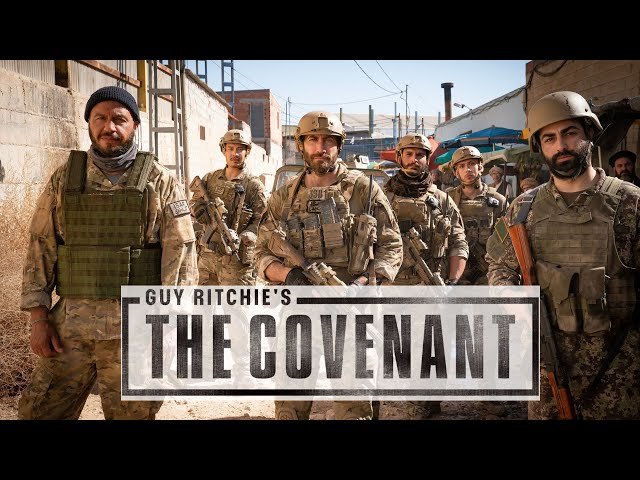
Guy Ritchie’s the Covenant
Guy Ritchie almost seems to disown this large, bursting war movie set in Afghanistan called “The Covenant” for about the first half of its runtime. It transforms into something closer to the second half of its title, initially, it’s a thoughtful self awareness story about a tough American sergeant named John Kinley (Jake Gyllenhaal) and his perceptive Afghan translator Ahmed (Dar Salim), who live with each other under an unspoken arrangement day in and day out. In return for Ahmed’s dangerous labor that could potentially get him or Fariba Sheikhan as his wife or child killed by Taliban retaliation, they will be granted visas to the United States. As a quiet, tense character study that examines America’s many broken promises with the Middle East and its people, “The Covenant” works best.
If only “The Covenant” were an indictment of American exceptionalism at any hour like it is during its first hour then maybe it would be one of the most candid depictions of our country’s actions in that region. But eventually Ritchie wakes up and starts moving this combat action flick towards gonzo territory.
In “The Covenant,” we’re immediately shown that everyone is in danger. To start, Kinley and his men do roadside checks as a team that specializes in recovering explosives or weapons of mass destruction. Their translator tries to get an Afghan truck driver to open his payload, but a bomb goes off instead, killing the translator and two other soldiers. When Ahmed shows up to fill the vacant position, he might strike the viewer as brusque, it’s just a paycheck to him. We find out later that Ahmed cares more about taking down the Taliban than he lets on.
This stoicism is what makes Ritchie, Ivan Atkinson and Marn Davies’ script so interesting. Because while Cinematographer Ed Wild’s camera seems glued to Kinley’s perspective, it’s really hypnotized by Ahmed. He knows everything from the local drug trade to when someone is lying right away he’s clearly an intelligent person who has his finger on the pulse of what’s happening around him in a way most others aren’t. He isn’t afraid to speak up or go off script, like negotiating with an informant or correcting Kinley when he misspeaks sourly rather than amusedly unamusedly. Salim knows exactly how much his broad frame plays for the camera; how threatening these soldiers see him as often not even acknowledging his presence even though he’s there to help them. Sadim also exhibits an intelligence brawnier gut-check soldier seen elsewhere war films.
However fissures begin opening up when Ritchie turns his visual interest away from Salim towards Gyllenhaal. After they’re attacked and have to fight their way back through the Afghan wilderness to base camp, will this partnership cause Kinley see Ahmed as human? For all Curtis disregards Poitier entirely at first glance (particularly once they’re chained together), Kinley never fully ignores him like Curtis does Poitier completely. Gyllenhaal’s psychologically firm performance suggests he trusts and even somewhat admires Ahmed, but there’s a clear personal distance outside of the workplace setting of war. Kinley would rather not know anything about Ahmed than have to know him in any way; which makes their fleeing through wilderness towards freedom an uneven arrangement where loyalty tethers Kinsely to Ahmed (really not friendship), but undeservedly honoring camaraderie soldiers share while serving together combat.
From here, “The Covenant” goes off the rails quickly and becomes closer to other Ritchie movies like “Wrath of Man” or “The Gentlemen.” Kinley has rabid fever dreams that are shot from oblique angles with frames that speed up and slow down, as a bombardment of sights and sounds nearly overwhelms the picture. The film’s entire second half also turns into Kinley trying to get visas for Ahmed and his family who are in hiding as they’re stuck at home in America.
Kinley’s phone calls, which make him jump through bureaucratic hoops, show how much the system doesn’t care about Afghan translators. Ritchie is telling a reality where America promises one thing only to use up their ally and cut them loose when they have no more value.
This story began two years ago, when the United States pulled out of Afghanistan and left behind many people who had worked with them to face the Taliban. It’s a failure that deserves to be told, but Ritchie can’t help himself from dressing these scenes in grating, melodramatic cliches. Kinley’s dutiful wife (Emily Beecham) is described only as a supportive spouse, and Kinley himself becomes more of a character designed for shock value than one with authentic or even comprehensible emotions.
Gyllenhaal does his best to shoulder Ritchie’s consistent tonal missteps. But there’s only so much he can do as his director steers “The Covenant” closer to James Bond territory. The explosions go bigger, the slow motion goes slower, and the bullets seemingly fly further in a final set piece placed atop a dam that defies the firm realism that governs the film’s first half. As black site contractors use an AC-130 gunship (an angel of death) to help Kinley and Ahmed, should we be grateful for the overwhelming firepower on display or rightfully horrified? When the credits roll, and we see white soldiers smiling with their arms around their Afghan translators some with their faces blurred or their eyes blacked out should we be touched or haunted?
“Guy Ritchie’s The Covenant” could have been more than a muscular, overwrought war film. It could have been an illuminating and restrained meditation on what went wrong in Afghanistan, sadly, this is not something Ritchie knows how to deliver.
For More Movies Visit Putlocker.